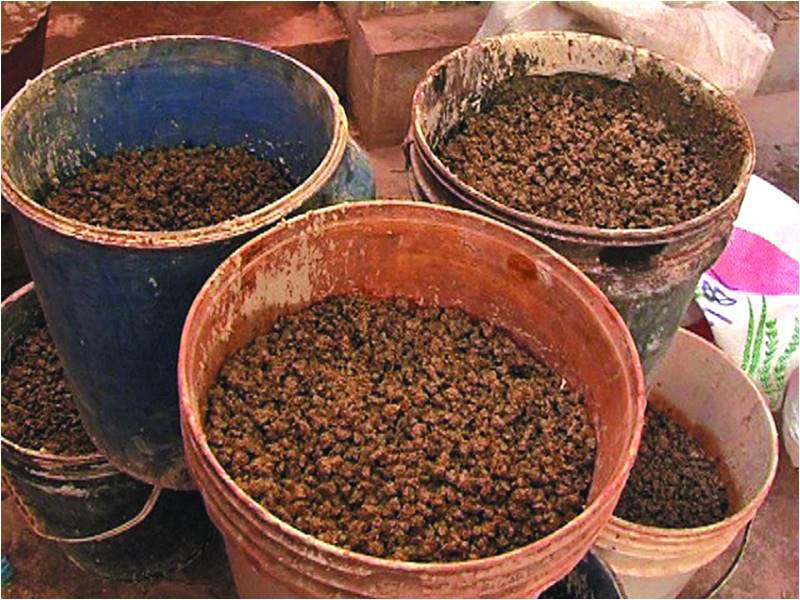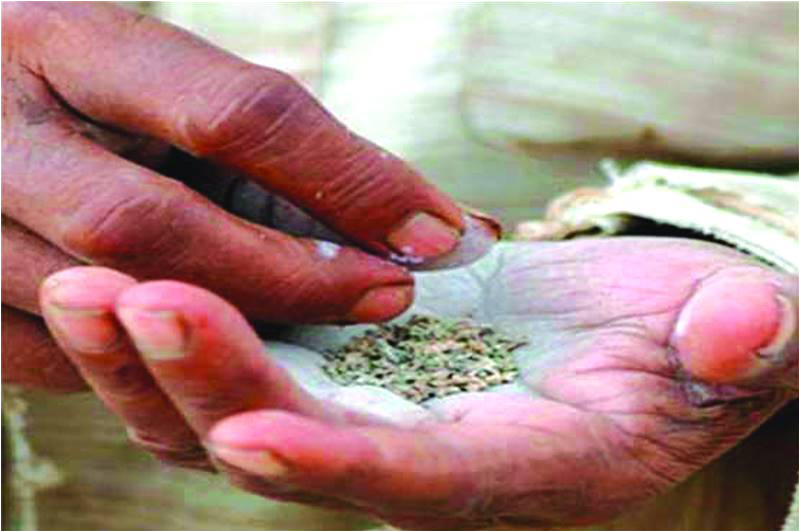
Oral cancer is the second most common type of cancer in Karachi. It has increased over the period of two decades, as the culture of Gutka eating and its addiction amongst the masses has taken the city by storm. Despite the ban imposed by local administrations on the making and selling of the substance, the consumption of Gutka, Paan (betel leaf) and Chalia (betel nut) is still a common practice amongst people living on and below the poverty line. In most cases, Gutka-eating leads to cancer and other oral diseases, as the ingredients used in making it have carcinogens.
90% of oral cancer patients have a prevalent history of consuming betel nut, Gutka, Mainpuri, Pan Parag, tobacco and other substitutes for paan, according to a report submitted by Dr. Aslam Jamali of NIMRA (Nuclear Institute of Medicine and Radiotherapy), which provides free or subsidized treatment to cancer patients in Karachi. The report states that the oral cancer patients are often registered for treatment at an advanced stage of cancer.
“Gutka which is a mix of chewing tobacco, artificial flavours, and colours, has one of the most potent known carcinogens. The contents of tobacco come in direct contact with mucous membrane and that creates cancer locally. Similarly, when one chews chalia, it has a double effect: there is abrasion to the mucous membranes and the surface becomes injured,” explains Dr. Kashif Rizvi, a consultant endocrinologist at Global Medical group. “Cancer begins as a patch of ulcer, injury, pain or hardness which continues to persist and gradually grow. It can cause ulceration within it which leads to very painful process of death of the local tissue. It creates severely deforming ulcers,” adds Rizvi.

According to Dr. Rizvi, the key to prevention is the monitoring of any patch which is not healing within a few days and becomes persistent and progressive. He also advises diabetic patients not to ignore any mouth sore or dental conditions.
Selling death in a packet
A gutka seller in Lyari, on the condition of anonymity, tells us that it was his family business. He says that even though a ban is imposed on the selling of gutka, customers still come to him and he remains unaffected by the ban. He sells customized gutka as per consumers’ demands. “We add areca nut for preparing gutka of inferior quality with other additives such as opium on demand of the customers. They feel relaxed after taking it,” he says.
According to Nawaz, resident of a neighbourhood in Lyari where people are running illegal gutka factories, the gutka prepared in some of these houses is much more injurious to health than any other type sold in the market. “They add animal blood collected from slaughter houses in the city to thicken the mixture. Some also add crushed glass which is more poisonous than any other form of gutka,” says Nawaz. He adds that in the market the two most popular types are geela gutka (wet gutka) and sookha gutka (dry gutka). Both are prepared in an unhygienic manner and are unpacked and home-made.
A study conducted by Dr. Ghazala Usman, Assistant Professor of community medicine at Jinnah Sindh Medical University states that in Pakistan, the risk of oral cancer is increased 8.5 to 10 times because of eating gutka and chewing tobacco. In Karachi, 21% male and 19.3% females are suffering from oral cavity cancer.
“7% of primary school children eat gutka and 96% women living on a coastal area of Karachi consume gutka while they breastfeed their child,” reports Dr. Usman.
The study also reveals that consumption and chewing of gutka causes precancerous lesions which has a high rate of malignant transformation and is extremely devastating – with no cure.
Hazardous concoction
“The emerging epidemic of oral submucous fibrosis has been credited to chewing of areca and its mixture,” says Dr. Aliza Baloch, Ziauddin Medical University. “4 out of 10 patients we receive daily consume gutka in their routine, especially those who belong to lower socio-economic class,” she said.
Talking about the symptoms of oral cancer, Dr. Baloch says that it includes “fibrosis of the buccal area of cheeks, tightened and stiff jaw that reduces the opening of the mouth, blister formation and bleeding sores, a lump or thickening of the skin or lining of the mouth etc.”
She adds: “I received a case of an 18-year-old boy, whose prognosis was very poor, his mouth opening was hardly a few millimeters and he couldn’t afford the surgery cost.”
Mohammad Abbas, a 27-year-old resident of Landhi, died of oral cancer due to excessive consumption of geela gutka in 2013. “He used to work at a tailor shop situated in the neighbourhood, he developed this habit due to long working hours. To stay up and not feel hungry, he would have gutka in his mouth all the time,” says 70-year-old Habiba Khatoon, mother of Abbas.
54-year-old Samina at Ziauddin Hospital, whose mother is an oral cancer patient, says, “Due to excessive consumption of betel nut (chalia), she started developing red spots inside her mouth which later turned into big sores. She complained of stiffness and jaw lock. Her cancer has now penetrated into her brain and lungs. She is now on chemo.”
There have been ample attempts by the Sindh Government to ban gutka in Karachi but due to the lack of honesty and implementation of the ban by the law enforcement agencies, the menace is still out there, killing people.
90% of oral cancer patients have a prevalent history of consuming betel nut, Gutka, Mainpuri, Pan Parag, tobacco and other substitutes for paan, according to a report submitted by Dr. Aslam Jamali of NIMRA (Nuclear Institute of Medicine and Radiotherapy), which provides free or subsidized treatment to cancer patients in Karachi. The report states that the oral cancer patients are often registered for treatment at an advanced stage of cancer.
“Gutka which is a mix of chewing tobacco, artificial flavours, and colours, has one of the most potent known carcinogens. The contents of tobacco come in direct contact with mucous membrane and that creates cancer locally. Similarly, when one chews chalia, it has a double effect: there is abrasion to the mucous membranes and the surface becomes injured,” explains Dr. Kashif Rizvi, a consultant endocrinologist at Global Medical group. “Cancer begins as a patch of ulcer, injury, pain or hardness which continues to persist and gradually grow. It can cause ulceration within it which leads to very painful process of death of the local tissue. It creates severely deforming ulcers,” adds Rizvi.

According to Dr. Rizvi, the key to prevention is the monitoring of any patch which is not healing within a few days and becomes persistent and progressive. He also advises diabetic patients not to ignore any mouth sore or dental conditions.
Selling death in a packet
A gutka seller in Lyari, on the condition of anonymity, tells us that it was his family business. He says that even though a ban is imposed on the selling of gutka, customers still come to him and he remains unaffected by the ban. He sells customized gutka as per consumers’ demands. “We add areca nut for preparing gutka of inferior quality with other additives such as opium on demand of the customers. They feel relaxed after taking it,” he says.
According to Nawaz, resident of a neighbourhood in Lyari where people are running illegal gutka factories, the gutka prepared in some of these houses is much more injurious to health than any other type sold in the market. “They add animal blood collected from slaughter houses in the city to thicken the mixture. Some also add crushed glass which is more poisonous than any other form of gutka,” says Nawaz. He adds that in the market the two most popular types are geela gutka (wet gutka) and sookha gutka (dry gutka). Both are prepared in an unhygienic manner and are unpacked and home-made.
A study conducted by Dr. Ghazala Usman, Assistant Professor of community medicine at Jinnah Sindh Medical University states that in Pakistan, the risk of oral cancer is increased 8.5 to 10 times because of eating gutka and chewing tobacco. In Karachi, 21% male and 19.3% females are suffering from oral cavity cancer.
“7% of primary school children eat gutka and 96% women living on a coastal area of Karachi consume gutka while they breastfeed their child,” reports Dr. Usman.
The study also reveals that consumption and chewing of gutka causes precancerous lesions which has a high rate of malignant transformation and is extremely devastating – with no cure.
90% of oral cancer patients have a prevalent history of consuming betel nut, Gutka, Mainpuri, Pan Parag, tobacco and other substitutes for paan, according to a report submitted by Dr. Aslam Jamali of NIMRA (Nuclear Institute of Medicine and Radiotherapy)
Hazardous concoction
“The emerging epidemic of oral submucous fibrosis has been credited to chewing of areca and its mixture,” says Dr. Aliza Baloch, Ziauddin Medical University. “4 out of 10 patients we receive daily consume gutka in their routine, especially those who belong to lower socio-economic class,” she said.
Talking about the symptoms of oral cancer, Dr. Baloch says that it includes “fibrosis of the buccal area of cheeks, tightened and stiff jaw that reduces the opening of the mouth, blister formation and bleeding sores, a lump or thickening of the skin or lining of the mouth etc.”
She adds: “I received a case of an 18-year-old boy, whose prognosis was very poor, his mouth opening was hardly a few millimeters and he couldn’t afford the surgery cost.”
***
Mohammad Abbas, a 27-year-old resident of Landhi, died of oral cancer due to excessive consumption of geela gutka in 2013. “He used to work at a tailor shop situated in the neighbourhood, he developed this habit due to long working hours. To stay up and not feel hungry, he would have gutka in his mouth all the time,” says 70-year-old Habiba Khatoon, mother of Abbas.
54-year-old Samina at Ziauddin Hospital, whose mother is an oral cancer patient, says, “Due to excessive consumption of betel nut (chalia), she started developing red spots inside her mouth which later turned into big sores. She complained of stiffness and jaw lock. Her cancer has now penetrated into her brain and lungs. She is now on chemo.”
There have been ample attempts by the Sindh Government to ban gutka in Karachi but due to the lack of honesty and implementation of the ban by the law enforcement agencies, the menace is still out there, killing people.

